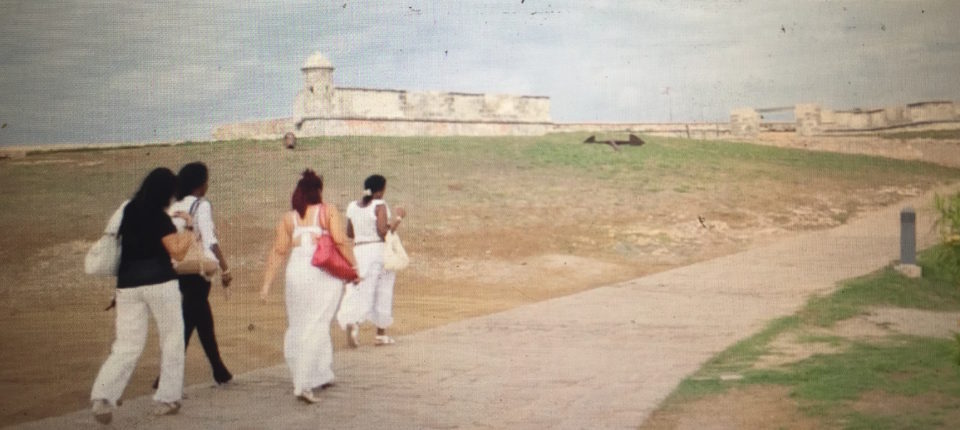So much of the humanities and social sciences within Cuban studies examine the macro-level perspectives of politics, race, gender, and environment, and these writings often center around the island’s capital. When I came to the poetry of Oscar Cruz, he changed the focus to the scale of neighborhood and city, and all of that was anchored in the island’s ‘second city.’ It would be trite to elaborate on the ajiaco of Santiago de Cuba’s ethnic and racial ingredients, or to use sweeping generalizations to characterize the political process that has captured the imagination of so many political scientists and economists.
The beauty of the poetry of Oscar Cruz is his daily-life, on-the-streets, perspective, lo cotidiano. It seems to me that the social and cultural fabric of our societies get overlooked at the neighborhood level. Cruz’s upbringing, however, was shaped by both the metro fringe of Santiago and the heart of the city. He playfully pulls out the role of gossip, noisy neighbors, ritual, love, intrigue, and power. He has a knack for weaving these disparate elements together in ways that convey a sense of place, landscape, and human emotions that transcend the island. His book, La Maestranza (The Armory), reflects the poet’s keen powers of observation in light, yet poignant ways. One shouldn’t let his sometimes male or even adolescent perspective of social life get in the way when reading his poetry. Rather, his uncompromising prose reveals the common features of our shared, human condition.
My approach to the translation of Oscar Cruz’s poems touches on all the clichés of the craft of both poetry and translation. His works speaks to me at so many levels. The nitty-gritty streets of Santiago, the city’s role as the birthplace of the island’s revolutions, and Cuban wit and street humor (el choteo) were the first elements to get under my skin and want me to read further. Having co-produced the 16-minute documentary, Soy Cubana, also fueled my desire to bring everything santiaguero to a broader audience.
Lo que cuenta
lo que cuenta es estar parado ahí,
en el borde de las gradas.
los perros frente a ti ladrando.
perros entrenados en el arte de matar.
perros welters con más de treinta libras.
(me gustaba estar ahí). la gente que viene
a estos lugares resulta interesante.
gente desahuciada con un rostro sin vida.
gente que viene por amor: amor a los zapatos,
amor a la ropa, amor al desastre;
y el desastre con su fuerza comenzaba
a interesarme.
los perros en su esencia eran bellos.
más bellos que mis padres,
más bellos que Dios. tenían rojas lenguas
y una forma masculina de babear.
sentí que mi vida estaba ligada a aquella baba,
a aquella forma envilecida de mirarse.
entonces saqué doscientos pesos
y se los puse al perro-nadie, un perro que nunca
había peleado y que lo haría contra uno
que sumaba dieciséis.
un perro invicto y secular como un gobierno.
comenzaron a matarse,
las bocas producían hechos de sangre.
instantes de duro placer.
perros que peleaban por lo posible
y lo imposible del hombre.
miraba las gradas y veía rostros brutales
de gente enajenada, feliz.
gente apostando a un cachorro sin vida.
al cabo de varios minutos
el perro al que había apostado ganó.
subido encima del otro ladraba una y otra vez.
lo cargaron como a un héroe y volvimos
en turba hacia la casa. íbamos callados.
escuchando cómo ríen, cómo hablan
los que ganan.
esa tarde supe lo que era un perdedor.
vi al perro derrotado en una jaba
sobre el borde del camino.
qué importa que hubiera ganado dieciséis.
la gloria en estos sitios dura poco.
y eso es lo que cuenta.
poco amor o poca vida no es tan malo.
lo que cuenta es saber que has apostado.
que has venido como ellos hasta aquí,
que has venido en la turba a darle diente
a la carne envejecida del amor.
What Matters
what matters is standing there
at the edge of the stands.
barking dogs in front of you
dogs trained in the art of killing.
welter-weight dogs more than 30 pounds.
(i liked being there). folks who go to
these places are interesting.
discouraged folks with lifeless faces.
folks that come for love: love of shoes,
love of clothes, disastrous love;
and the strength of disaster started
to interest me.
in essence, the dogs were beautiful.
more beautiful than my parents,
more beautiful than God. they had red tongues
and a sort of masculine way of drooling.
i felt as if my life was connected to that dribble,
to that degraded way of looking.
i pulled out $200 pesos
and i placed a bet on a no-name dog, a dog that had never
killed and who would go up against one
that had sixteen fights.
the dog was undefeated and secular as a government.
they started to kill each other,
their mouths produced gore.
moments of hard pleasure.
dogs that fought for what was possible
and impossible for men.
i looked at the stands and saw the brutal faces
of alienated folks, happy.
folks betting on a lifeless puppy.
at the end of a few minutes
the dog that I had bet won.
standing on top of the other, it barked over and over.
they carried it like a hero and we went back
with the mob to the house. we left in silence.
listening to how they laugh,
how winners speak.
that afternoon i learned what a loser is.
i saw the defeated dog in a bag
on the side of the road.
it doesn’t matter if he won sixteen times.
the glory in these places is short lived.
and that’s what matters.
a little love or a little life isn’t so bad.
what matters is knowing that you have waged a bet.
that you have come like them,
that you have come in the mob to take a bite
out of love’s aged flesh.
Forever
la tarde en que Margela murió
había pasado frente a mí en una china
y destruida bicicleta.
“estoy pa’ tu cartón”, me dijo
y continuó sonriente por el centro de la calle.
cuadras después, un silo de concreto
le pasaba por encima borrando de golpe
su belleza.
casi difunta llegó al hospital.
la bella al parecer tenía líos con el mundo.
cinco personas asistimos al entierro.
su padre
su madre
y dos hermanos
que hablaban todo el tiempo sobre pesca.
Forever
the afternoon Margela died
she had passed in front of me
on a beat up Chinese bicycle
“I want to jump your bones!” “she said to me
smiling as she went down the middle of the street.
a few blocks later, a concrete mixing truck
slammed into her, erasing
her beauty.
she was almost dead when she got to the hospital.
seems like the beauty had trouble with the world.
just five people came to the burial.
her father
her mother
and two brothers
who talked the whole time about fishing.
Oscar Cruz (Santiago de Cuba, 1979) has published five poetry books including Los Malos Inquilinos (2008), Las Posesiones (2010), Balada del Buen Muñeco (2013), Esto el SOLO LO PEOR (2013) andLa Maestranza (2014). He has won numerous literary prizes, including the Premio David, Premio Pinos Nuevos and Premio La Gaceta de Cuba. Cruz’s poetry struggles for validation in a world where necessity has rendered the poetical superfluous.


